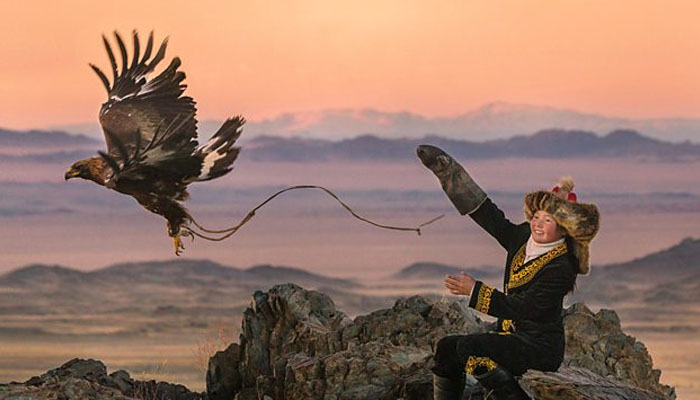Mongolia's Kazakh-origin eagle huntresses no longer caught in patriarchy's talons
Mongolia has a long history of Kazakh-origin women hunting eagles
A group of girls and women in Mongolia, mainly of Kazakh origin are challenging current patriarchal norms and gender roles by keeping their old tradition of eagle hunting alive.
"Eagle hunting always included women," said Adrienne Mayor, a Stanford University historian describing the history of the activity as covered in a 2016 research paper titled The Eagle Huntress - Ancient Traditions and New Generations.
Additionally, archaeology reveals that eagle huntresses were more prevalent in earlier periods.
Only the Kazakhs of western Mongolia's Altai mountain area hunt with golden eagles, and there are currently 400 active falconers among them.
When teenage eagle huntress Aisholpan Nurgaiv was the subject of a widely shared photograph made by Israeli photographer Asher Svidensky in 2013, Kazakh women in Mongolia attracted attention from all around the world.
In 2014, he visited the nation once more along with British filmmaker Otto Bell, who had produced a documentary about the adolescent.
The storyline focused on her being an outlier in Kazakh culture in what Bell described as an “isolated” community with “a certain kind of ignorance about what woman can do”.
These remarks were made during a press interview on CBS's Mountain Morning Show in January 2016, where he also said she was the “first woman to eagle hunt in the 2,000-year-old male-dominated history”.
But Kazakhs and historians say this is not true, as many women have hunted throughout Mongolia's history.
The eagles are not bred in captivity; rather, they are captured as young birds from nests. Female eaglets are preferred since they develop into larger adults. A huge adult female can weigh up to seven kilograms and have a wingspan of more than 230cm.
A hunter releases his grown eagle for the last time on a spring morning after years of service, leaving a butchered sheep on the mountain as a farewell gift. For the benefit of future generations, Svidensky explains that this is how the Kazakh eagle hunters ensure that the eagles return to nature and have their own powerful infants.
-
Murder suspect kills himself after woman found dead in Missouri
-
Poll reveals majority of Americans' views on Bad Bunny
-
Man convicted after DNA links him to 20-year-old rape case
-
California cop accused of using bogus 911 calls to reach ex-partner
-
'Elderly' nanny arrested by ICE outside employer's home, freed after judge's order
-
key details from Germany's multimillion-euro heist revealed
-
Search for Savannah Guthrie’s abducted mom enters unthinkable phase
-
Barack Obama addresses UFO mystery: Aliens are ‘real’ but debunks Area 51 conspiracy theories












